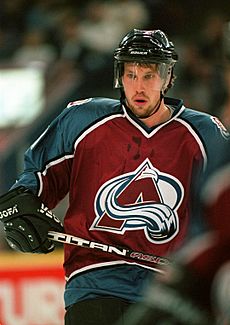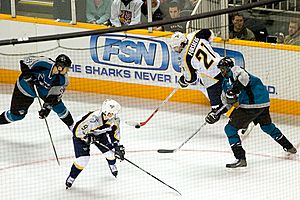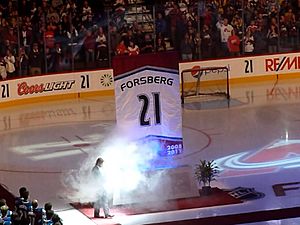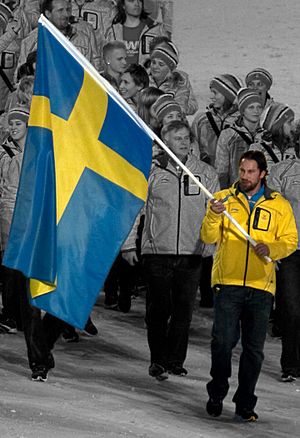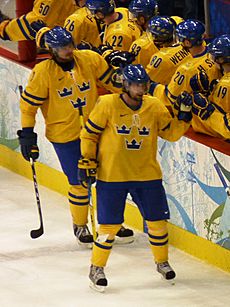Peter Forsberg facts for kids
Quick facts for kids Peter Forsberg |
|||
|---|---|---|---|
| Hockey Hall of Fame, 2014 | |||
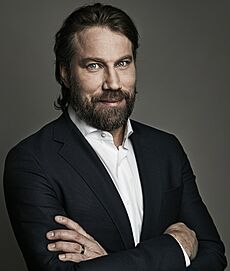
Forsberg in 2016
|
|||
| Born | 20 July 1973 Örnsköldsvik, Sweden |
||
| Height | 6 ft 0 in (183 cm) | ||
| Weight | 205 lb (93 kg; 14 st 9 lb) | ||
| Position | Centre | ||
| Shot | Left | ||
| Played for | Modo Hockey Quebec Nordiques Colorado Avalanche Philadelphia Flyers Nashville Predators |
||
| National team | |||
| NHL Draft | 6th overall, 1991 Philadelphia Flyers |
||
| Playing career | 1989–2011 | ||
Peter Forsberg, born on July 20, 1973, is a famous Swedish ice hockey player who used to play professionally. He was also an assistant manager for Modo Hockey. People called him "Peter the Great" or "Foppa". Peter was known for seeing the whole ice and playing with a lot of strength. Many consider him one of the greatest hockey players ever.
Even though injuries shortened his career, he is still one of the top players in NHL history. As of 2021, he ranks eighth in points-per-game and fifth in assists-per-game. Only legends like Wayne Gretzky, Mario Lemieux, Bobby Orr, and Connor McDavid are ahead of him in assists. In 2017, he was named one of the '100 Greatest NHL Players'.
During his 19-year career, he played 13 years in the National Hockey League (NHL). He won two Stanley Cups with the Colorado Avalanche. He also won individual awards, like the Hart Memorial Trophy in 2003 for being the league's most valuable player. He is the seventh-highest Swedish scorer in NHL regular season history. Forsberg always had a positive plus-minus rating until his short comeback in 2011. His overall rating was +238.
Peter Forsberg played for Sweden in many international tournaments. He competed in four Winter Olympics, two World Cups, and five World Championships. He also played in junior championships. He won four gold medals with Sweden. These include the 1992 and 1998 World Championships. He also won gold at the 1994 and 2006 Winter Olympics.
Because he won two Stanley Cups and multiple Olympic and World Championship gold medals, he is a member of the Triple Gold Club. He is the only Swede to win each of these three major competitions twice. In 2013, he joined the IIHF Hall of Fame. In 2014, he was elected into the Hockey Hall of Fame.
Contents
Growing Up: Peter Forsberg's Early Life
Peter Forsberg was born in Örnsköldsvik, Sweden. His father, Kent Forsberg, was a coach for Modo Hockey and the Swedish national team. Peter's father coached him for a big part of his career. They worked together with Modo from 1991 to 1994. They also teamed up for the national team in the 1996 World Cup, 1998 Olympics, and the 1998 World Championship, which Sweden won.
Peter played youth hockey with his friend Markus Näslund. They were born only ten days apart in Örnsköldsvik. They played on different youth teams at first. Later, they joined the regional Ångermanland all-star team for a national championship in 1988. They continued to play together for Modo Hockey and the Swedish national team. Peter and Markus also went to high school together. They even had summer jobs at the same electrical company when they were 18.
When Peter was growing up, his favorite player was Håkan Loob. Loob was a star in both the Elitserien and the NHL.
Playing Career: Peter Forsberg's Journey
Starting Out with Modo Hockey (1989–1994)
Peter Forsberg first played for the junior team of Modo Hockey in 1990. This was the club in his hometown of Örnsköldsvik. In that same season, he played his first game with the senior team in the Elitserien. This is the top professional league in Sweden. He got an assist in his only game. In the 1990–91 season, he scored 102 points with the junior team. He also got 17 points in 23 games with the senior team.
After that season, the Philadelphia Flyers picked Forsberg sixth overall in the 1991 NHL Entry Draft. He was the first European player chosen that year. Many people were surprised because they thought he would be picked later.
A big trade happened involving Eric Lindros. Lindros was picked first overall by the Quebec Nordiques but refused to play for them. Forsberg was part of a trade that sent five players, two first-round draft picks, and money to the Quebec Nordiques for Lindros. Looking back, this trade helped the Nordiques and later the Avalanche become very successful.
Forsberg stayed in Sweden and played for Modo for three more years. In 1993, he won the Guldpucken award for Player of the Year. He also won the Guldhjälmen award for Most Valuable Player of the Elitserien. He won both awards again in 1994. He led his team to their first final since 1979. Modo lost the final series. By this time, many thought Forsberg was the best player outside the NHL.
In the summer of 1994, Forsberg decided to play in the NHL. He had signed a contract with the Quebec Nordiques in 1993. However, a lockout delayed his NHL debut until 1995. Forsberg went back to Modo to play 11 more games before heading to North America.
Quebec Nordiques and Colorado Avalanche (1995–2004)
The 1994–95 NHL season started on January 21, 1995, after the lockout ended. On that day, Forsberg played his first NHL game against the Philadelphia Flyers. He got his first NHL assist. Six days later, he scored his first NHL goal. His first season was amazing. He scored 50 points in 47 games. He was second in scoring for the Nordiques and won the Calder Memorial Trophy for the best rookie. He was also chosen for the NHL All-Rookie Team.
On July 1, 1995, the Nordiques team moved to Denver, Colorado. They became the Colorado Avalanche on August 10, 1995. Forsberg had scored the last goal in Nordiques history.
Forsberg joined a strong team with players like Joe Sakic and Patrick Roy. In their first year in Denver, the Avalanche won the Stanley Cup. Forsberg scored 116 points in the regular season and 21 more in the playoffs. He was second in points on the team. In Game 2 of the Stanley Cup Finals, Forsberg scored three goals in one period. This was a rare achievement. The 1995–96 season was Forsberg's highest-scoring year. It was also the only NHL season where he played every game.
In the 1996–97 season, Forsberg played fewer games due to an injury. But he still got 86 points. Colorado won its first Presidents' Trophy. Forsberg also had his only NHL fight against Martin Lapointe. In the playoffs, Colorado lost to Detroit.
In 2001, the Avalanche won their second Stanley Cup. After one playoff round, Forsberg had to have surgery for a serious injury and could not play more. He took the next season off to recover. He came back for the playoffs and led all players in scoring with 27 points. However, his team lost.
The 2002–03 was a great year for Forsberg. He played on a very productive line with Alex Tanguay and Milan Hejduk. He was healthier and led the league with 106 points. He won the Art Ross Trophy for most points and the Hart Memorial Trophy for league MVP.
Playing for the Philadelphia Flyers (2005–2007)
Peter Forsberg returned to Modo Hockey during the 2004–05 NHL lockout. He played only 33 games due to injuries. He scored 39 points.
After the lockout, Forsberg returned to the NHL. The Colorado Avalanche had to let him go because of new salary cap rules. He signed a two-year contract with the Philadelphia Flyers, the team that first drafted him.
Before the season, he had surgery on his right ankle. He debuted with the Flyers on October 5. He got two assists in his first game. Despite playing only 60 games due to a groin injury, he scored 75 points. The Flyers lost in the first round of the playoffs.
After the season, he had more surgery on his right foot. On September 14, 2006, Forsberg became the 15th captain in Flyers history. This season was tough for him. The Flyers had their worst season ever, and Forsberg was still dealing with foot problems.
Short Time with the Nashville Predators (2007)
With his contract ending, the Flyers traded Forsberg to the Nashville Predators on February 15, 2007. This trade helped Nashville in their playoff run. Forsberg returned to Denver for the first time since leaving the Avalanche. The Predators won that game, and Colorado missed the playoffs. This was the first time the Avalanche missed the playoffs since moving to Colorado. The Predators lost in the first round of the playoffs. Forsberg had less than one point per game in the regular season for the first time in his career.
Final Years and Retirement (2007–2011)
For most of the 2007–08 season, Forsberg was a free agent. He said he might not return to the NHL. He had foot surgery and waited to see if he could play. On February 25, 2008, Forsberg signed a contract with the Colorado Avalanche for the rest of the season.
Forsberg's first game back with the Avalanche was on March 4, 2008. But he was injured after only three games. On April 1, he scored his first goal of the season. Even after a long break, Forsberg was first among all NHL players in points-per-game during the 2007–08 season.
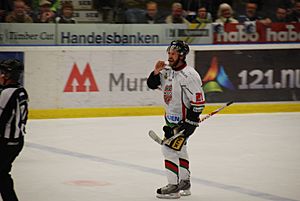
Forsberg played two seasons with Modo from 2008 to 2010. His friend Markus Näslund joined him in the second year. On August 14, 2010, Forsberg said he was not hopeful about returning to hockey.
On January 21, 2011, it was announced that Forsberg was training with the Colorado Avalanche. He was trying to make a comeback in the NHL. On February 6, the Avalanche announced they signed Forsberg for the rest of the 2010–11 season. Forsberg played his first game back on February 11. He played two road games but had no points.
On February 14, 2011, just hours before his first home game back, Forsberg announced his retirement. He held a press conference to explain his decision. He said he could not defend himself on the ice and still had foot problems.
Life After Hockey
On April 20, 2011, Forsberg was named an assistant general manager for the Modo organization. He worked with his long-time friend Markus Näslund.
On October 8, 2011, the Colorado Avalanche retired Forsberg's jersey number. This happened before their first game of the 2011–12 season. On February 26, 2015, Modo Hockey also officially retired his number in his hometown.
Business Ventures
Forsberg is involved in many businesses. He was an early investor in Crocs shoes. He also partly owns an airline called Nextjet. Forsberg and his father own a Swedish development company. This company helped fund Modo Hockey's new arena. Forsberg also owned a company that imported Crocs shoes to Sweden. He closed it in 2010 after losing money.
Peter is also interested in harness racing. He has owned several racing horses. He has also invested in a golf course in his hometown.
Playing for Sweden: International Career
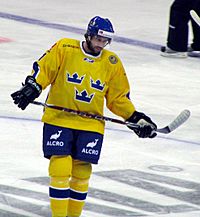 |
||
| Medal record | ||
|---|---|---|
| Representing |
||
| Ice hockey | ||
| Winter Olympics | ||
| Gold | 1994 Lillehammer | |
| Gold | 2006 Torino | |
| World Championships | ||
| Gold | 1992 Czechoslovakia | |
| Gold | 1998 Switzerland | |
| Silver | 1993 Germany | |
| Silver | 2003 Finland | |
| Silver | 2004 Czech Republic | |
| World Junior Championships | ||
| Silver | 1992 Germany | |
| Silver | 1993 Sweden | |
Forsberg played for Sweden's under-18 team in 1991. He led the tournament in scoring with 17 points. Later, he played in two World Junior Championships. In 1992, he helped Sweden win a silver medal. A few months later, Forsberg played for the Swedish men's team at the 1992 World Championships. He helped Sweden win a gold medal.
In 1993, he played in his second World Junior Championships. Forsberg set a tournament record with 24 assists and 31 points in seven games. He scored ten points in one game against Japan. Many consider him the best player in World Junior history. In 1994, he led Sweden to a gold medal at the Winter Olympics. He scored the winning goal in a penalty shootout. A picture of this goal was even put on a Swedish postage stamp.
After his second year in the NHL, Forsberg played in the 1996 World Cup. He helped Sweden win a bronze medal. In 1998, he played in the 1998 Winter Olympics. This was the first Olympics with NHL players. Sweden finished fifth. Later that year, Sweden won a gold medal at the 1998 World Championships. Forsberg had 11 points.
In 1999, Forsberg played his 100th game for the Swedish national team. He played in the World Championships again in 2003 and 2004. Sweden won silver medals both times.
Forsberg played in the 2004 World Cup. Two years later, he won his second Olympic gold medal at the 2006 Games in Turin, Italy. His last international appearance was at the 2010 Winter Olympics in Vancouver. He was Sweden's flag bearer for the opening ceremonies. Sweden finished fifth.
How Peter Forsberg Played
"He's such an unselfish player. He's one of those players who would rather make a pretty play and feed somebody else for the goal than score himself."
Peter Forsberg was a superstar forward. He had amazing playmaking skills and great vision on the ice. He combined skill with physical play. Many thought he was the best two-way player in the world. He was good at both offense and defense. People said he had a "Wayne Gretzky-like" passing touch. He made the players around him better. Because he played with such strength, he helped change the idea that Swedish hockey players were not tough.
Dealing with Injuries
Forsberg's strong style of play led to many serious injuries. Some say he got injured often because he did not change his game as he got older. In his 14 seasons in the NHL, he missed a whole season once. He also played in less than 90% of games in eight other seasons.
He missed many games in the 1996–97 due to a bruised thigh. Before the 1999–2000 season, he had shoulder surgery. He missed more games due to shoulder injuries, a concussion, and a hip injury. In the 2000–01 season, he missed games with a rib injury. Then, he had a serious spleen injury in the playoffs.
At the start of the 2001–02 season, he took time off to heal. In January 2002, he had foot surgery. Foot problems continued to bother him for the rest of his career. In the 2003–04 season, he missed 43 games due to groin and abdominal injuries. While playing for Modo Hockey during the lockout, he had surgery for a dislocated wrist and a broken hand bone.
Personal Life
Peter Forsberg and his childhood friend Markus Näslund started an organization called Icebreakers. This group brings together professional hockey players for exhibition games. They raise money for charities.
In late 2010, Forsberg got engaged to Nicole Nordin in Paris. They had their first child, a son, in June 2012. Their second child, a daughter, was born in September 2014. In May 2016, they had their third child. The family lived in Zug, Switzerland, starting in 2018. On May 1, 2023, the couple announced they were separating.
Career Statistics
Regular Season and Playoffs
| Regular season | Playoffs | |||||||||||||
|---|---|---|---|---|---|---|---|---|---|---|---|---|---|---|
| Season | Team | League | GP | G | A | Pts | PIM | GP | G | A | Pts | PIM | ||
| 1989–90 | Modo Hockey | SWE U20 | 30 | 15 | 12 | 27 | 42 | — | — | — | — | — | ||
| 1989–90 | Modo Hockey | Allsv | 1 | 0 | 1 | 1 | 4 | — | — | — | — | — | ||
| 1990–91 | Modo Hockey | SWE U20 | 39 | 38 | 64 | 102 | 56 | — | — | — | — | — | ||
| 1990–91 | Modo Hockey | SEL | 23 | 7 | 10 | 17 | 22 | — | — | — | — | — | ||
| 1991–92 | Modo Hockey | SEL | 39 | 9 | 18 | 28 | 78 | — | — | — | — | — | ||
| 1992–93 | Modo Hockey | SWE U20 | 2 | 0 | 3 | 3 | 4 | — | — | — | — | — | ||
| 1992–93 | Modo Hockey | SEL | 39 | 23 | 24 | 47 | 92 | 3 | 4 | 1 | 5 | 0 | ||
| 1993–94 | Modo Hockey | SEL | 39 | 18 | 26 | 44 | 82 | 11 | 9 | 7 | 16 | 14 | ||
| 1994–95 | Modo Hockey | SEL | 11 | 5 | 9 | 14 | 20 | — | — | — | — | — | ||
| 1994–95 | Quebec Nordiques | NHL | 47 | 15 | 35 | 50 | 16 | 6 | 2 | 4 | 6 | 4 | ||
| 1995–96 | Colorado Avalanche | NHL | 82 | 30 | 86 | 116 | 47 | 22 | 10 | 11 | 21 | 18 | ||
| 1996–97 | Colorado Avalanche | NHL | 65 | 28 | 58 | 86 | 73 | 14 | 5 | 12 | 17 | 10 | ||
| 1997–98 | Colorado Avalanche | NHL | 72 | 25 | 66 | 91 | 94 | 7 | 6 | 5 | 11 | 12 | ||
| 1998–99 | Colorado Avalanche | NHL | 78 | 30 | 67 | 97 | 108 | 19 | 8 | 16 | 24 | 31 | ||
| 1999–00 | Colorado Avalanche | NHL | 49 | 14 | 37 | 51 | 52 | 16 | 7 | 8 | 15 | 12 | ||
| 2000–01 | Colorado Avalanche | NHL | 73 | 27 | 62 | 89 | 54 | 11 | 4 | 10 | 14 | 6 | ||
| 2001–02 | Colorado Avalanche | NHL | — | — | — | — | — | 20 | 9 | 18 | 27 | 20 | ||
| 2002–03 | Colorado Avalanche | NHL | 75 | 29 | 77 | 106 | 70 | 7 | 2 | 6 | 8 | 6 | ||
| 2003–04 | Colorado Avalanche | NHL | 39 | 18 | 37 | 55 | 30 | 11 | 4 | 7 | 11 | 12 | ||
| 2004–05 | Modo Hockey | SEL | 33 | 13 | 26 | 39 | 88 | 1 | 0 | 0 | 0 | 2 | ||
| 2005–06 | Philadelphia Flyers | NHL | 60 | 19 | 56 | 75 | 46 | 6 | 4 | 4 | 8 | 6 | ||
| 2006–07 | Philadelphia Flyers | NHL | 40 | 11 | 29 | 40 | 72 | — | — | — | — | — | ||
| 2006–07 | Nashville Predators | NHL | 17 | 2 | 13 | 15 | 16 | 5 | 2 | 2 | 4 | 12 | ||
| 2007–08 | Colorado Avalanche | NHL | 9 | 1 | 13 | 14 | 8 | 7 | 1 | 4 | 5 | 14 | ||
| 2008–09 | Modo Hockey | SEL | 3 | 1 | 2 | 3 | 0 | — | — | — | — | — | ||
| 2009–10 | Modo Hockey | SEL | 23 | 11 | 19 | 30 | 66 | — | — | — | — | — | ||
| 2010–11 | Colorado Avalanche | NHL | 2 | 0 | 0 | 0 | 4 | — | — | — | — | — | ||
| NHL totals | 708 | 249 | 636 | 885 | 690 | 151 | 64 | 107 | 171 | 163 | ||||
| SEL totals | 214 | 88 | 137 | 225 | 452 | 15 | 13 | 8 | 21 | 16 | ||||
International Play Statistics
| Year | Team | Event | Result | GP | G | A | Pts | PIM | |
|---|---|---|---|---|---|---|---|---|---|
| 1991 | Sweden | EJC | 4th | 6 | 5 | 12 | 17 | 16 | |
| 1992 | Sweden | WJC | 7 | 3 | 8 | 11 | 30 | ||
| 1992 | Sweden | WC | 8 | 4 | 2 | 6 | 6 | ||
| 1993 | Sweden | WJC | 7 | 7 | 24 | 31 | 8 | ||
| 1993 | Sweden | WC | 8 | 1 | 1 | 2 | 12 | ||
| 1994 | Sweden | OG | 8 | 1 | 6 | 7 | 6 | ||
| 1996 | Sweden | WCH | SF | 4 | 1 | 4 | 5 | 6 | |
| 1998 | Sweden | OG | 5th | 4 | 1 | 4 | 5 | 6 | |
| 1998 | Sweden | WC | 7 | 6 | 5 | 11 | 0 | ||
| 2003 | Sweden | WC | 8 | 4 | 5 | 9 | 6 | ||
| 2004 | Sweden | WC | 2 | 0 | 1 | 1 | 2 | ||
| 2004 | Sweden | WCH | QF | 4 | 1 | 2 | 3 | 0 | |
| 2006 | Sweden | OG | 6 | 0 | 6 | 6 | 0 | ||
| 2010 | Sweden | OG | 5th | 4 | 0 | 1 | 1 | 2 | |
| Junior totals | 20 | 15 | 44 | 59 | 54 | ||||
| Senior totals | 63 | 19 | 38 | 56 | 46 | ||||
All-Star Games
| Year | Location | G | A | Pts | |
|---|---|---|---|---|---|
| 1996 | Boston | 0 | 0 | 0 | |
| 1997 | San Jose | — | — | — | |
| 1998 | Vancouver | 0 | 1 | 1 | |
| 1999 | Tampa Bay | 0 | 0 | 0 | |
| 2000 | Toronto | — | — | — | |
| 2001 | Denver | 1 | 2 | 3 | |
| 2003 | Florida | 1 | 0 | 1 | |
| All-Star totals | 2 | 3 | 5 | ||
Career Achievements and Awards
NHL Awards
| Award | Year(s) |
|---|---|
| Calder Memorial Trophy (Best Rookie) | 1995 |
| NHL All-Rookie Team | 1995 |
| Stanley Cup Champion | 1996, 2001 |
| NHL First All-Star Team | 1998, 1999, 2003 |
| Art Ross Trophy (Most Points) | 2003 |
| Bud Light Plus/Minus Award (shared with Milan Hejduk) | 2003 |
| Hart Memorial Trophy (League MVP) | 2003 |
Swedish League (Elitserien) Awards
| Award | Year(s) |
|---|---|
| Guldpucken (Player of the Year) | 1993, 1994 |
| Guldhjälmen (Most Valuable Player) | 1993, 1994 |
International Awards
| Award | Year(s) |
|---|---|
| World Junior Championship A – All-Star Team | 1993 |
| World Junior Championship A – Best Forward | 1993 |
| World Championship A – All-Star Team | 1998 |
| World Championship A – Best Forward | 1998 |
| IIHF Hall of Fame | 2013 |
Other Awards
| Award | Year(s) |
|---|---|
| Viking Award (Best Swede in NHL) | 1996, 1998, 1999 |
| Yanick Dupre Memorial | 2006 |
| Stora Grabbars Märke (Great Player Award) | 2009 |
Records Set by Peter Forsberg
- Forsberg set a record at the 1993 World Junior Championships with 31 points in only seven games. He also holds the record for most career points in the tournament with 42 points.
- With his second Olympic Gold in 2006, he became one of only three players to be a member of the Triple Gold Club twice.
- As of October 1, 2016, Forsberg ranks eighth in NHL history for points-per-game, with 1.25 points per game.
- He is ranked fourth all-time in NHL career assists-per-game with 0.898. Only Wayne Gretzky, Mario Lemieux, and Bobby Orr are ahead of him.


